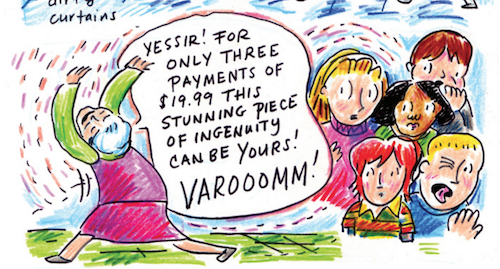Thursday Comics Hangover: All-singing, all-dancing

A panel from Rina Ayuyang's Blame This On the Boogie.
It's a clear sign of the Short Run Comix & Arts Festival's rising fame that Montreal comics publisher Drawn and Quarterly chose the festival for the world premiere of cartoonist Rina Ayuyang's new memoir Blame This On the Boogie. Ayuyang will appear at Short Run on Saturday and she'll be in conversation with Seattle cartoonist Megan Kelso at the Central Library on Sunday at 1 pm. Boogie is the kind of high-profile debut that D&Q could have hosted anywhere, but Boogie is a natural fit for Short Run: it shares an ingenuity and an exuberance with the festival.
Ayuyang, the daughter of Filipino immigrants, grew up in Pittsburgh with a large and boisterous family. Boogie is a coming-of-age story, a story about the challenges and rewards of family, and a tribute to the glamorous and goofy world of dance entertainment — particularly movie musicals and reality dance competitions. Perhaps that last element sounds out of place in a synopsis, but it couldn't feel more right on the page. Thematically and artistically, Boogie is a triumph; it brings the energy and joy of a truly great musical to the comics page.
Ayuyang's colorful, vibrant comics bear no relationship to the darkly cynical autobiographical comics of the late 1990s and early 2000s. Her panels aren't often separated by gutters, and panel after panel clambers onto the page, resulting in a bright parade of color and emotion. With no panel borders, elements from previous panels leak into the story and characters seem to be mingling together without regard for time or space. It feels like a story told by a narrator who is so excited that she jumbles elements of the story together, leaping back and forth through time, but Ayuyang retains total control over every element of her craft. She knows exactly what she's doing.
The book begins with a wide, sweeping look at Ayuyang's suburb from miles in the air. The greens are sketched in with what appear to be colored pencil. Our perspective is closing in on Ayuyang's house, a respectable two-floor middle-class home.
"From afar, it looks perfect," Ayuyang tells us in a caption.
She closes in on the front door. "But if you look closer, things aren't always what they seem."
Then a closeup of the pebbled green glass of the front door. "Beyond this door," Ayuyang warns the reader, "lies a story of dread and woe, despair and sadness."
Turn the page, though, and we see a young Ayuyang playing in a warm and cozy home. Toys are splayed all around her. "I'm kidding," she writes. "It's just a mess. Mostly mine."
The characters in Boogie certainly do confront pain and heartbreak, but the story is a happy one. Ayuyang is a cheerful narrator — even as she describes her addiction to Facebook and the conflict of reality smashing up against the monolith of fantasy, she's inclined to be a positive and generous host.
Boogie is a series of anecdotes that accrue together into something much bigger than the sum of its parts. Not every trick in the book works — a major time jump near the middle of the book feels very abrupt, and it takes the reader a few pages to catch up to all the developments in Ayuyang's life — but every trick is attempted in good faith, with an excitement for the medium that is infectious.
It's hard to convey the precision of a good dance number to comics, and Ayuyang often is forced to relate whole dance routines in one or two wavy lines and a couple of distorted figures. But it's hard to imagine any cartoonist being able to transfer the complexity of a densely choreographed dance number with ink and paper. What Ayuyang fails to report in accuracy, she more than makes up for in enthusiasm. Short Run is where Seattle's youngest and most promising cartoonists go for inspiration, they would be well advised to pick up Boogie and learn at Ayuyang's (dancing) feet. Comics could use a lot more of this color and life and energy.